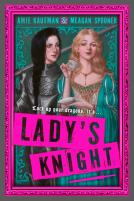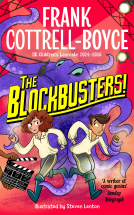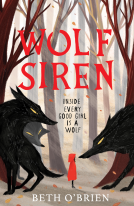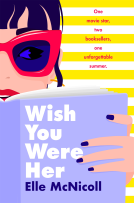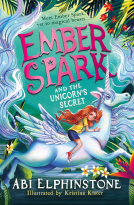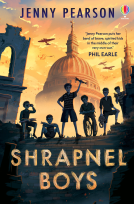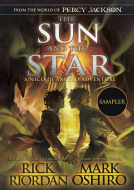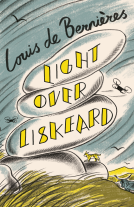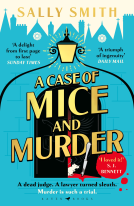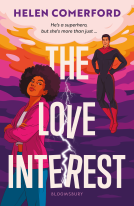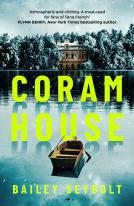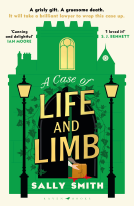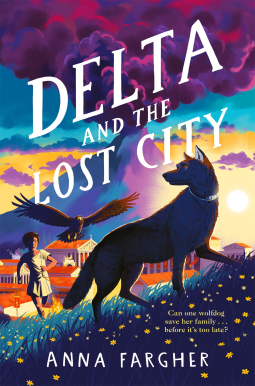
Delta and the Lost City
by Anna Fargher
This title was previously available on NetGalley and is now archived.
Send NetGalley books directly to your Kindle or Kindle app
1
To read on a Kindle or Kindle app, please add kindle@netgalley.com as an approved email address to receive files in your Amazon account. Click here for step-by-step instructions.
2
Also find your Kindle email address within your Amazon account, and enter it here.
Pub Date 4 Jul 2024 | Archive Date 7 Jun 2024
Talking about this book? Use #DeltaandtheLostCity #NetGalley. More hashtag tips!
Description
' . . . ought to be the children's hit of the summer' - I Paper
Follow Delta the wolfdog around Pompeii in 79 AD while the shadow of the great volcano Mount Vesuvius looms, from the bestselling, award-winning author of The Umbrella Mouse, Anna Fargher. Illustrated throughout in black and white by David Dean.
It’s the year 79 AD, and the earth around Pompeii is quaking . . .
Young wolfdog Delta finds herself on the run and escaping her family’s villa after bearing witness to a horrible crime. With the help of her eagle friend, Bellona, Delta navigates the tricky terrain full of threatening creatures and thieves outside the ancient city's walls.
But the earth is warning of a much larger threat, and determined to warn her family, Delta must race against time and find them before it’s too late . . .
Journey with Delta through an inspiring journey around the ancient city of Pomepii and the famous eruption of Mount Vesuvius in 79 AD.
'Ambitious and wonderful' – Michael Morpurgo, author of War Horse on The Umbrella Mouse.
Available Editions
| EDITION | Other Format |
| ISBN | 9781529046892 |
| PRICE | £7.99 (GBP) |
| PAGES | 224 |
Available on NetGalley
Featured Reviews
 Jacqui S, Reviewer
Jacqui S, Reviewer
History is a vast subject and while we are all interested in different parts of it – or none at all – there are some events from the past with which almost everyone is not only familiar but finds utterly fascinating. The eruption of Mt Vesuvius in AD 79 that buried the now world-famous towns of Pompeii and Herculaneum is one such event – one that has long inspired works of fiction and continues to do so.
When my attention was brought to this new middle grade title from the author of the gorgeous Umbrella Mouse being on Net Galley, I immediately requested it – despite being on a self-imposed ban from doing so – and was very excited when I was swiftly approved. Another story told through the eyes of an animal – in this case dog Delta – this is another tale of bravery under the most difficult of circumstances, and one that is destined to be a popular addition to young readers’ shelves.
Delta is lucky enough to live within the confines of a beautiful countryside villa when we meet her – a home she shares with her mother Luna, her master Lucius and Lucius’s pet golden eagle Bellona. Welcoming Herminia, Lucius’s heavily pregnant daughter, as she arrives en route to Pompeii with her unkind husband Marcus, Delta wishes that her mistress had not moved away and accompanies her as she heads to speak with her father. After briefly talking with him, Marcus banishes her from the room before he takes advantage of his father-in-law’s age and frailty to bring about his death.
Now able to wield power over the household, Marcus plans to sell Delta but before he is able to, she manages to escape together with Bellona and the pair of them vow to bring Marcus to justice. Aware that he and Herminia are to head to Pompeii, the two animals make their way there with the intention of helping Herminia break free of her unhappy marriage and they start to search for her.
But finding their mistress is not the only problem that they encounter within the town. As its residents prepare for an annual festival, it is increasingly hit by earth tremors. With the humans unaware of the significance of this, can Delta and Bellona find Herminia and help her to escape before the eruption of Vesuvius, or are they all destined to fall victim to its powers and – like so many – remain there forever more?
Young readers will adore Delta. Intelligent, brave and fiercely loyal to not just Herminia but also to the slaves who have served her well throughout her life, together with Bellona Delta does her utmost to free them all from Marcus’s tyranny, see that his wicked crime doesn’t go unpunished and – ultimately – bring about their escape from Pompeii.
The historical details of life within the town and the eruption that brought it to the world’s attention are rich and well-researched, bringing the action brilliantly to life – making this not just a wonderful adventure but also highly informative and a story that will appeal to those who are already young history fans and, hopefully, spark an interest in those who are not. With the text accompanied throughout by David Dean’s wonderful illustrations, this is a read that is perfect for Year 4 upwards, either as a solo read or one that is shared, and would make a great class reader to accompany a topic on the Romans.
My enormous thanks go to both publisher Macmillan Children’s Books and to Net Galley for my virtual advance read. Delta and the Lost City hits the shelves July 4th.
 Kate G, Reviewer
Kate G, Reviewer
A cracking historical read perfect for confident readers to lose themselves in. This is going to be top of the list for all history fans to read as the perfect escape.
 Reviewer 850130
Reviewer 850130
We adored this instant classic book. It has history, excitement, friendship and a race against time. All of the children loved. Personally, I think that I might read it again soon by myself just for the joy of it.
 Reviewer 1265715
Reviewer 1265715
A fantastic adventure!
In AD79, Mount Vesuvius erupted, burying the city of Pompeii and everything in its near proximity in molten lava. Pompeii became a lost city.
Told through the eyes of Delta, a faithful dog living in a villa in the countryside outside of Pompeii, this book would make the perfect accompaniment to studying the Romans. When her master is murdered by his son-in-law, Delta must find his mistress and save her from her dangerous husband. With the help of Bellona, the family's pet golden eagle, she heads into Pompeii to search for Herminia and whilst the people of the town prepare to celebrate, the animals sense imminent danger. Can Delta find Herminia before it is too late and will she survive?
The Book Clubbers age 9-11 loved Delta and Bellona and it was a fantastic, historical fictional novel that proved exceptionally popular with them and us.
Thank you to NetGalley and Macmillan Publishers for sending this eBook for review consideration. All opinions are our own.
 Emma D, Reviewer
Emma D, Reviewer
I enjoyed reading this book so much! I really like that Delta would not give up on finding her mum and her owners!
All of the characters were really brave but I think Delta was the bravest.
A book about one of the biggest natural disasters in the ancient world probably doesn't strike many as the sort to be a potentially sweet narrative, but Fargher's doggy heroine manages to bring a little light to Pompeii.
As is the trend with middle-grade at the moment, the Delta of the title is our protagonist, a wolf-dog living in a countryside villa in the shadows of Pompeii with her mother, Luna, eagle friend Bellona, and the human cast: enslaved woman Gaia, her son, Neo, Lucius, the master of the house, and Herminia, Lucius' daughter. Also present is Herminia's husband Marcus, but as we discover very early on, Marcus isn't exactly a pinnacle of niceness. When Delta witnesses a horrible crime in her home, she finds herself on the run with Bellona, evading beasts and thieves in the wilderness. But, as she sets about trying to right the wrong that has torn her family apart, Vesuvius begins to rumble, and another disaster is on its way.
Animal stories fit really nicely into the genre of childrens' historical fiction, and Delta is no different: it's not the first novel to tackle Pompeii for younger audiences (I say as an avid Roman Mysteries reader at the age of 9), but Delta's perspective brings new aspects to light that might otherwise be missed in a novel with a human protagonist. The Vesuvius scenes especially are very poignant in their detail and narration, and lots of the smaller historical details (such as the crowds tying pillows to their heads to cushion the falling rock from the volcano) are peppered in nicely, in a way that's subtly educational without being overbearing. While I'm not an artist myself, David Dean's illustrations work well with the tone throughout: it's characterful while also being stark monochrome.
Delta's relationships with her animal family members are also really refreshing to read. Her conversations and interactions with Bellona gives their relationship an almost big-sister feel, whereas it isn't often that parental relationships are explored in animal stories, so Delta's interactions with Luna, and her consequent desire to find her later in the novel, makes a really nice change to the standard Incredible Journey-esque canine character motivation to find human owners. It also creates more of an analogue between Delta and her readers, for whom close relationships with adult caregivers are presumed to be important.
It's always a complex manoeuvre to discuss slavery in ancient Greek and Roman stories for children in a way that accentuates how awful the institution of slavery is, while equally reinforcing the endemic use of slavery as an economic system within the ancient world. Fargher managed to strike a pretty good compromise in this regard by using Delta as a viewpoint character: her position as a dog places her in a liminal position to view this from a separate viewpoint. She isn't a free creature herself - she's a pet, and some of the events of the novel are tracked based on whichever collar she's wearing - but equally she isn't an enslaved human, meaning that she can view the system from a removed level while simultaneously empathising with the injustices we see. There is a scene in the first third where Gaia and her son Neo are separated in a slave market, which is particularly harrowing - while Delta's POV means this doesn't become completely upsetting to a child reader, it doesn't shy away from the trauma and injustice associated with the scene, and simultaneously places Delta on par with Neo due to both of them being separated from their mothers, a strong emotional core for childrens' fiction. However, the novel very nearly sidles into the trope of the 'good slave master', which it avoids purely by the skin of its teeth. Despite his friendship with Severinius, a wealthy Roman boy whom Neo and Delta rescue from bandits, and consequently the son of Neo's enslaver, Fargher is thorough in ensuring that Neo remains miserable the entire time he is separated from Gaia: Severinius has a sense of justice, but equally one where slavery is an endemic part of his life, and as such he treats it like this. Since Greeks and Romans are big parts of the Key Stage 2 curriculum, I imagine this would be an interesting classroom conversation to have.
As I implied earlier, Marcus, Herminia's husband, isn't the nicest of the cast of characters: as we learn pretty early on in the novel, the business he runs is a scam, he's a greedy criminal, and he doesn't treat Herminia well - not helped by the fact that she is pregnant with his child. There's a genuine sense of menace to his characterisation: he's obviously an abject villain given the numerous crimes and cruelties he inflicts, but his presence as an abusive husband towards Herminia makes him increasingly sinister in a way that's accessible to young readers. Fargher does a great job throughout of taking what might be deemed very adult themes and presenting them in a way that's emotionally-resonant while equally not traumatising. In terms of my qualms with this novel, most of them are line-level editorial issues which may just be an issue with the proof copy: while I imagine these have been rectified, I'll mention them here anyway since they were present in my reading. There are several lines which are clunky and don't read particularly well, and which would have benefitted from another read-through, but again, these are very easily rectified.
Overall, Delta and the Lost City is a fun little novel with a lot of heart at its centre, and a new canine hero to join the legions of dog protagonists in childrens' books: she's a joy to read, and I'm sure she'll resonate with a wide audience of children and adults alike.
Thank you to Macmillan Children's and Netgalley for an eArc in exchange for an honest review!
Readers who liked this book also liked:
Rick Riordan; Mark Oshiro
Children's Fiction, LGBTQIA, Teens & YA
Keith Martin; Konstantinos Mersinas; Guido Schmitz; Jassim Happa
Business, Leadership, Finance, Computers & Technology, Reference
